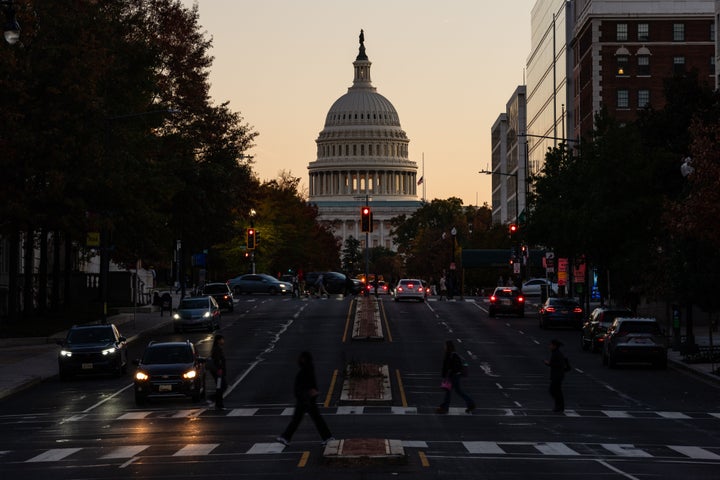🔴 Website 👉 https://u-s-news.com/
Telegram 👉 https://t.me/usnewscom_channel
The government shutdown has thrown many parts of the country into disarray. Furloughed federal workers aren’t getting paychecks, people on the Supplemental Nutrition Assistance Program aren’t getting their funds and air travel is chaotic as flight cancellations soar.
Another less-obvious problem is also brewing. The Centers for Disease Control and Prevention, which is a government agency, hasn’t been updating or publishing its nationwide respiratory virus tracking data because of the shutdown. These virus-tracking tools monitor a number of viruses, but notably the flu, COVID-19 and RSV levels throughout the country.
In non-shutdown times, doctors and public health officials then use this data to inform health decisions, send public alerts and monitor sickness in communities.
“This means we are having a hard time accessing data that is important for public health,” said Elisabeth Marnik, the chief science officer at Those Nerdy Girls, an online organization dedicated to sharing accurate health and science information.
“It’s a major challenge,” added Dr. Robert Hopkins, the medical director of the National Foundation for Infectious Diseases.
The most recent CDC data is from the end of September, leaving the public and medical professionals in the dark during a time of year when virus spread is known to happen because of holiday gatherings and more time spent indoors.
This isn’t good for your health, your family’s health or the health of the nation. Here’s what to know:
Without CDC virus tracking data, doctors have a harder time diagnosing patients and prescribing treatment.
This data-tracking pause presents an issue for doctors, nurses and scientists who rely on CDC data and analysis. “With less information, it’s harder to spot trends or to plan ahead,” according to Hopkins.
“If I have knowledge about what’s circulating in the community, then it’s much easier for me to make triage decisions when you call the [doctor’s] office with symptoms,” he said.
For example, if your doctor knows (from CDC data) that flu is widespread in your community and you report symptoms of cough and fever, they’ll quickly know to look into flu as the potential cause of your symptoms.
“By knowing what’s going on around us … it can change our approach. We have antivirals for flu, for COVID, and in a high-risk patient, we want to implement those as early as possible,” Hopkins said.
This could mean some patients won’t get the medication they need as quickly as they normally would.
The CDC virus data includes wastewater tracking. “We often see spikes in wastewater detection of things like COVID-19 before patients start appearing in urgent care and emergency departments,” Marnik said.
“That early warning can be helpful,” she added. This can help emergency departments plan for the potential influx of patients.
“With infectious disease, the earlier you know something, the better,” said Marnik.
The data also helps doctors and patients make their own informed decisions about traveling, protection measures and more.
“Viruses don’t take vacations. The longest government shutdown ever puts everyone’s health at greater risk because the data and reports that are essential for monitoring the spread of diseases haven’t been updated for weeks,” said Lucky Tran, a scientist and public health communicator.
If doctors and scientists don’t know what is currently circulating in the community, neither will the public.
“Normally, this type of data is useful because it allows the public to make decisions related to things like masking, traveling and attending in-person events,” Marnik said.
For instance, you may choose not to attend a concert if you know COVID-19 levels are high in your area, but if you don’t have that information available, you may go to the concert and end up sick a few days later.
Viruses regularly start to pick up in the fall and winter months as people spend more time indoors and travel for holiday gatherings. Not knowing what viruses are around us as folks make plans for Thanksgiving is dangerous. Say you have a newborn and want to make sure you protect them from RSV; it’s harder to make those tough decisions about the holidays without the data to inform them.
When experts know a certain virus is spreading in a community, they can get the message out and let individuals know what red-flag symptoms to look out for. But without this tracking, that isn’t possible to do, Hopkins added.
Eric Lee via Getty Images
Scientists will also struggle tracking new virus variants without data.
“Scientists also use this data to understand patterns and note if there are shifts that are occurring that may signal things like a new variant of COVID-19 or potentially human-to-human transmission of something like bird flu,” Marnik said. (There has not yet been human-to-human bird flu transmission, she stressed.)
Is there a new COVID-19 variant taking off in the U.S. right now? Hopefully not, but we don’t know because of the current lack of CDC data.
It’s worth noting that there is still global virus and COVID-19 tracking by the World Health Organization, along with virus tracking in other countries, Marnik said. However, if a new COVID strain starts or takes off, local public health departments would eventually track the new variant, but the time it takes to do so would likely be longer than how long it takes the CDC to detect new variants, Marnik said.
It also makes it hard to understand what’s going on with respiratory virus season overall.
The CDC tracking data also helps scientists and doctors understand whether it’s a typical respiratory virus season or a worse one, Marnik said.
Last year’s flu season was bad, and we knew this from CDC tracking data. This season’s flu patterns are largely unknown so far, but flu often is rampant during Thanksgiving week and after the holiday.
“And we are a couple weeks shy of Thanksgiving, and we don’t have [flu] data right now,” said Jessica Malaty Rivera, an infectious disease epidemiologist.
“We can assume, based on southern hemisphere data, that it’s going to be a pretty bad [flu] season, but that’s because I’m an epidemiologist, and I know that the average person may not know that,” Malaty Rivera added.
“Viruses don’t take vacations. The longest government shutdown ever puts everyone’s health at greater risk because the data and reports that are essential for monitoring the spread of diseases haven’t been updated for weeks.”
– Lucky Tran
The CDC was already facing challenges, but this shutdown only makes them worse.
Virus tracking data at the CDC isn’t as good as it once was because of funding changes and much more, but it still offers nationwide health tracking that many people rely on.
“Cutting down on staff at HHS and CDC started some of this challenge, and now we’ve got the shutdown that gives us an even greater challenge on having national-level data,” said Hopkins.
There are a few non-federal government tools that give providers and the public a peek into virus patterns in states throughout the country, but they provide a more limited look, he added.
Your state or city’s public health department may have some data, and the same goes for your local hospital, but the data available varies greatly from community to community.
“Some communities have relatively robust local surveillance, while others have little to none,” Hopkins said. “So, there are some tools out there, but we are missing an awful lot by not having the robust nationwide data that CDC was able to give us previously.”
Malaty Rivera said this halt in tracking will also only add to another problem the CDC is facing — eroding trust in public health.
“Because if the scientists don’t have the information, how on earth are the public going to be able to know who to trust? That information void is going to send people into places that are potentially harmful,” Malaty Rivera added.
There are measures you should take right now to stay healthy.
There are some online tracking tools you can rely on (in addition to, potentially, your local public health department). “Agencies and foundations and public health scientists are filling in those gaps as much as possible,” said Malaty Rivera.
WastewaterSCAN tracks virus levels in wastewater across the country, and the Pandemic Mitigation Collaborative has a state-by-state resource list, according to Marnik. Walgreens also has a respiratory illness index that folks can reference.
Because virus tracking isn’t as robust as normal, there are also steps you can take to avoid illnesses like the flu, COVID-19 and RSV.
Vaccination is important, Malaty Rivera stressed. Flu shots are available to everyone 6 months and up — the COVID-19 vaccine is also available to those 6 months and up, but the guidelines are more confusing. It’s worth talking to a pharmacist or doctor to see if you’re eligible (conditions such as sedentary lifestyle and depression are in the eligibility guidelines).
“Masks still work. If you’re sick, stay home. It’s the same stuff that we’ve been saying for the past few years, and those lessons are not going to expire just because the pandemic is over,” Malaty Rivera added.
Not having access to this lifesaving health data is harmful. “This risks the health of all Americans and isn’t helping to make us more healthy,” Marnik said.
“Anytime we don’t have timely, transparent data that is publicly available, especially during high-transmission seasons, whether it’s influenza season, whether it’s during a COVID surge, it is a harm to the public,” said Malaty Rivera. “And really an injustice, if I’m honest, because this data belongs to the public, and people deserve to be informed.”

